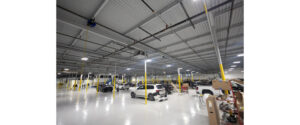A new commission has been set up to study auto body reimbursement rates and make recommendations to lawmakers
Editor’s note: The following is an Op-Ed released by Alliance of Automotive Service Providers of Massachusetts (AASP/MA) written by Executive Director Lucky Papageorg.
Every year more drivers in Massachusetts are being hit with out-of-pocket collision repair costs despite paying insurance premiums that have climbed by some 254 percent over the last three decades.
You ask why? Massachusetts has the lowest reimbursement rates for auto body labor costs in the nation, a situation that burdens consumers, hurts body repair shops and creates potentially dangerous scenarios of unsafe vehicles operating on the state’s streets.

Today’s labor reimbursement rate paid by insurers to claimants is about $40 per hour, the same as it was 11 years ago, and up by just $10, in nearly 34 years. By comparison, the nation’s Consumer Price Index is up about 121 percent over that time, and auto insurance premiums have spiked by 254 percent.
Additionally, cars have become far more technologically and mechanically complex, leading to more expensive and time-consuming repairs.
Simply put, at today’s costs of running a business at a labor reimbursement rate to the claimant of $40 per hour doesn’t come close to what a repair shop has to charge consumers for the work. That means consumers, who are already paying $1,400 or more in insurance premiums, more often have to dig into their own pockets to cover the unreimbursed labor cost portion of repairs.
A new body, the Labor Rate Study Commission, has been set up in Massachusetts to study auto body reimbursement rates and make recommendations to lawmakers. The commission recently held its first hearing. In addition to collecting data from auto body shops and looking at reimbursement rates in other states, the commission should urge consideration of proposed legislation that would directly address the state’s low reimbursement rates.
A bill filed by Rep. James Hawkins would set a sensible approach to the reimbursement disparity, increasing the minimum reimbursement to the claimant over a two-year period and then adjusting them annually based on the federal Consumer Price Index for the Northeast region which includes Massachusetts. Hawkins’s bill would bring Massachusetts reimbursement rates in line with those of other states.
This bill would protect consumers by reducing the likelihood of repairs costing more than insurance companies will reimburse, leading to the consumer having to make up the difference. It will enhance public safety as well, since some consumers put off repairs or will agree to substandard repairs that could diminish the safety and value of the vehicle, when they cannot afford to pay that which the insurer refuses.
The bill would also help body repair shops who have had to absorb increases in labor, operating and new equipment costs. Coupled with the constant upgrades in technology while receiving reimbursement rates unchanged since 2010 has created an unsustainable business model which no retail business can be expected to endure.
It is not realistic to expect Massachusetts body shops to repair increasingly complex vehicles in an environment of increasingly higher costs while facing reimbursement levels far lower than any other state in the nation.
This isn’t the first effort by Beacon Hill to address the reimbursement issue. A prior commission was created in 2008 to collect information and make recommendations to lawmakers. No action was ever taken based on the 2008 commission’s findings which indicated if insurers did not take substantial steps on their own to correct the disparity, that lawmakers should address the situation legislatively.
Lawmakers cannot allow another failure. The new commission should do their work quickly and make recommendations that squarely address the disparity between Massachusetts and neighboring states, as well as nationally. Lawmakers should listen, and act.









Comments are closed.